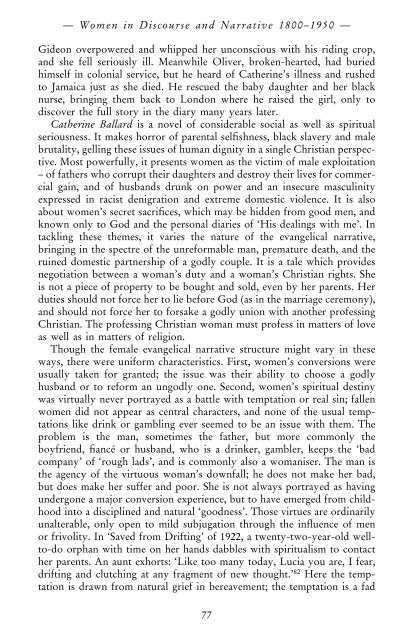The Death of Christian Britain
The Death of Christian Britain
The Death of Christian Britain
You also want an ePaper? Increase the reach of your titles
YUMPU automatically turns print PDFs into web optimized ePapers that Google loves.
— Women in Discourse and Narrative 1800–1950 —<br />
Gideon overpowered and whipped her unconscious with his riding crop,<br />
and she fell seriously ill. Meanwhile Oliver, broken-hearted, had buried<br />
himself in colonial service, but he heard <strong>of</strong> Catherine’s illness and rushed<br />
to Jamaica just as she died. He rescued the baby daughter and her black<br />
nurse, bringing them back to London where he raised the girl, only to<br />
discover the full story in the diary many years later.<br />
Catherine Ballard is a novel <strong>of</strong> considerable social as well as spiritual<br />
seriousness. It makes horror <strong>of</strong> parental selfishness, black slavery and male<br />
brutality, gelling these issues <strong>of</strong> human dignity in a single <strong>Christian</strong> perspective.<br />
Most powerfully, it presents women as the victim <strong>of</strong> male exploitation<br />
– <strong>of</strong> fathers who corrupt their daughters and destroy their lives for commercial<br />
gain, and <strong>of</strong> husbands drunk on power and an insecure masculinity<br />
expressed in racist denigration and extreme domestic violence. It is also<br />
about women’s secret sacrifices, which may be hidden from good men, and<br />
known only to God and the personal diaries <strong>of</strong> ‘His dealings with me’. In<br />
tackling these themes, it varies the nature <strong>of</strong> the evangelical narrative,<br />
bringing in the spectre <strong>of</strong> the unreformable man, premature death, and the<br />
ruined domestic partnership <strong>of</strong> a godly couple. It is a tale which provides<br />
negotiation between a woman’s duty and a woman’s <strong>Christian</strong> rights. She<br />
is not a piece <strong>of</strong> property to be bought and sold, even by her parents. Her<br />
duties should not force her to lie before God (as in the marriage ceremony),<br />
and should not force her to forsake a godly union with another pr<strong>of</strong>essing<br />
<strong>Christian</strong>. <strong>The</strong> pr<strong>of</strong>essing <strong>Christian</strong> woman must pr<strong>of</strong>ess in matters <strong>of</strong> love<br />
as well as in matters <strong>of</strong> religion.<br />
Though the female evangelical narrative structure might vary in these<br />
ways, there were uniform characteristics. First, women’s conversions were<br />
usually taken for granted; the issue was their ability to choose a godly<br />
husband or to reform an ungodly one. Second, women’s spiritual destiny<br />
was virtually never portrayed as a battle with temptation or real sin; fallen<br />
women did not appear as central characters, and none <strong>of</strong> the usual temptations<br />
like drink or gambling ever seemed to be an issue with them. <strong>The</strong><br />
problem is the man, sometimes the father, but more commonly the<br />
boyfriend, fiancé or husband, who is a drinker, gambler, keeps the ‘bad<br />
company’ <strong>of</strong> ‘rough lads’, and is commonly also a womaniser. <strong>The</strong> man is<br />
the agency <strong>of</strong> the virtuous woman’s downfall; he does not make her bad,<br />
but does make her suffer and poor. She is not always portrayed as having<br />
undergone a major conversion experience, but to have emerged from childhood<br />
into a disciplined and natural ‘goodness’. Those virtues are ordinarily<br />
unalterable, only open to mild subjugation through the influence <strong>of</strong> men<br />
or frivolity. In ‘Saved from Drifting’ <strong>of</strong> 1922, a twenty-two-year-old wellto-do<br />
orphan with time on her hands dabbles with spiritualism to contact<br />
her parents. An aunt exhorts: ‘Like too many today, Lucia you are, I fear,<br />
drifting and clutching at any fragment <strong>of</strong> new thought.’ 82 Here the temptation<br />
is drawn from natural grief in bereavement; the temptation is a fad<br />
77








